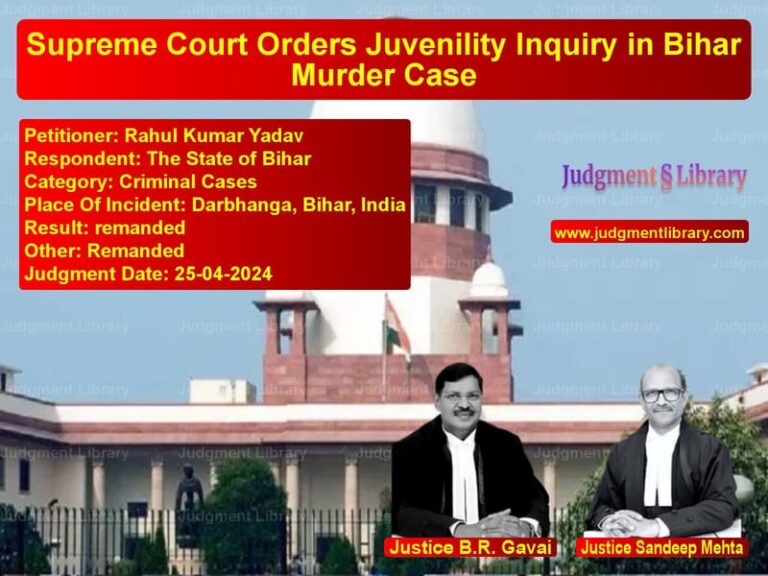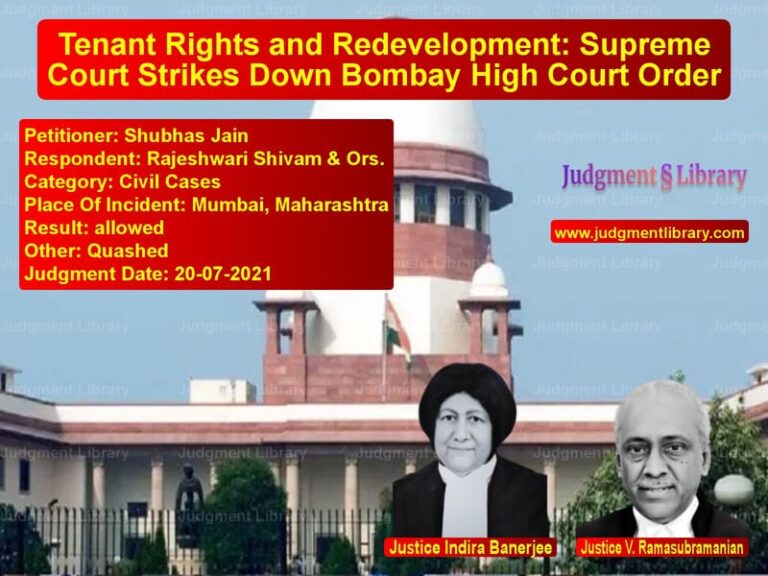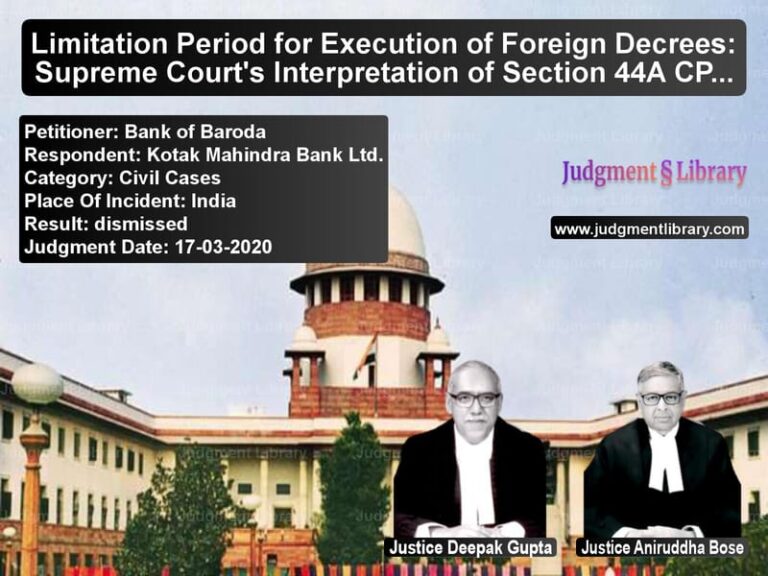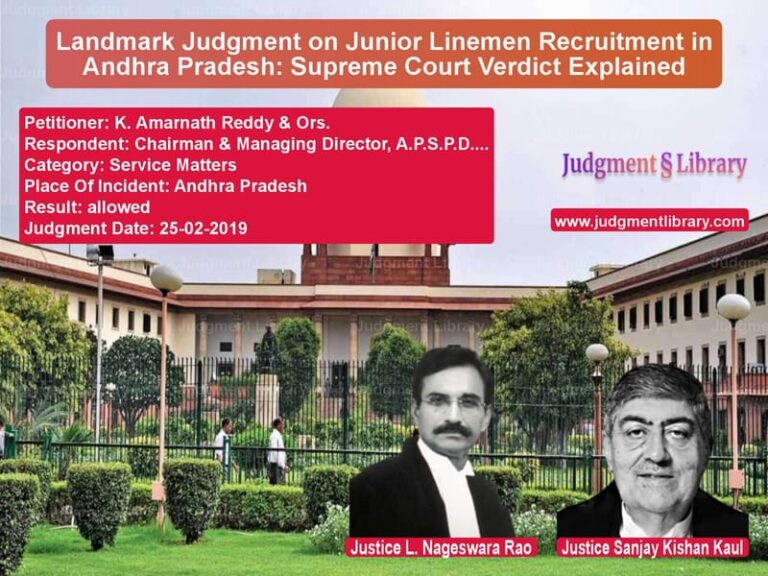Bhuwalka Steel Industries Case: Supreme Court on Taxation and Rule 5 of 1997 Rules
The case of Bhuwalka Steel Industries Ltd. & Anr. vs. Union of India & Ors. is a significant Supreme Court ruling regarding taxation under the Central Excise Act and the vires of Rule 5 of the 1997 Rules. The case primarily dealt with the challenge to the validity of Rule 5, which was alleged to be ultra vires of the parent Act and in violation of Article 14 of the Constitution of India.
Background of the Case
The appellants, Bhuwalka Steel Industries Ltd., and others challenged the provisions of Rule 5 of the 1997 Rules, which imposed differential tax burdens on manufacturers based on the Annual Capacity of Production (ACP). They argued that the Rule created two distinct classes:
- Manufacturers whose ACP was determined to be more than their actual production in the Financial Year 1996-97.
- Manufacturers whose ACP was determined to be less than their actual production for the same year.
The appellants contended that this differentiation imposed an unfair tax burden on the second category, violating their fundamental right to equality under Article 14.
Arguments by the Appellants
The appellants argued:
- That Rule 5 of the 1997 Rules was ultra vires as it exceeded the authority granted under Section 3-A of the Central Excise Act.
- The Rule created an arbitrary classification among manufacturers, leading to an unfair and irrational tax burden.
- It violated Article 14 of the Constitution by treating similarly placed manufacturers differently.
- The matter was previously addressed in Venus Castings (2000) 4 SCC 206 and Supreme Steels (2001) 9 SCC 645, but required further examination.
Arguments by the Respondents (Union of India)
The respondents countered:
- That the classification under Rule 5 was reasonable and had a rational nexus with the objective of revenue collection.
- The ACP-based taxation model was a policy decision aimed at ensuring tax compliance and preventing revenue leakage.
- Previous rulings in Venus Castings and Supreme Steels had upheld similar provisions, and no further examination was required.
High Court Decision
The High Court upheld the validity of Rule 5, stating that the classification was justified and not in violation of Article 14. The appellants, aggrieved by this decision, approached the Supreme Court.
Supreme Court’s Analysis
The Supreme Court, comprising R.F. Nariman, Aniruddha Bose, and V. Ramasubramanian, analyzed whether the matter required further examination. The Court noted that:
“The validity of Rule 5 of the 1997 Rules is challenged on two grounds: (1) that the Rule is ultra vires the authority conferred under Section 3-A of the Act, and (2) that the Rule is violative of Article 14 of the Constitution.”
The Court observed that the Division Bench, instead of addressing the primary challenge, had referred an unrelated issue to a larger Bench:
“Whether an assessee who chooses once to pay duty in terms of Rule 96-ZP(3) can be compelled to pay duty calculated in accordance with the said Rule for all times to come without any regard to the actual production is a question which requires examination.”
Supreme Court’s Ruling
The Supreme Court found that the core issue raised by the appellants regarding the validity of Rule 5 was not addressed by the Division Bench. Instead, a different question concerning the applicability of Rule 96-ZP(3) had been referred. The Court ruled:
“This being the case, we answer this reference by stating that the question posed before us did not arise at all on facts and the question which has been referred is not something which the assessee disputes.”
The Court directed that the matter be sent back to a Division Bench to decide the core issues raised in the appeal.
Implications of the Judgment
The judgment is significant for taxation law and administrative justice. It highlights:
- Judicial Discipline: The Supreme Court reaffirmed that when a specific issue is raised, courts should not deviate and frame unrelated questions.
- Taxation Law Clarity: The decision ensures that taxation rules must conform to constitutional principles and not impose arbitrary burdens.
- Revenue Considerations vs. Fairness: The ruling recognizes the need for a fair tax system while balancing government revenue objectives.
Conclusion
The Supreme Court’s ruling in Bhuwalka Steel Industries Ltd. vs. Union of India is a significant milestone in taxation jurisprudence. It ensures that judicial scrutiny remains focused on core constitutional challenges rather than diverting to unrelated matters. The judgment upholds principles of fairness in taxation and underscores the importance of addressing ultra vires claims properly within the legal framework.
Petitioner Name: M/S Bhuwalka Steel Industries Ltd & Anr..Respondent Name: Union of India & Ors..Judgment By: Justice R.F. Nariman, Justice Aniruddha Bose, Justice V. Ramasubramanian.Place Of Incident: India.Judgment Date: 05-12-2019.
Don’t miss out on the full details! Download the complete judgment in PDF format below and gain valuable insights instantly!
Download Judgment: MS Bhuwalka Steel I vs Union of India & Ors Supreme Court of India Judgment Dated 05-12-2019.pdf
Direct Downlaod Judgment: Direct downlaod this Judgment
See all petitions in Income Tax Disputes
See all petitions in Tax Evasion Cases
See all petitions in Banking Regulations
See all petitions in Judgment by Rohinton Fali Nariman
See all petitions in Judgment by Aniruddha Bose
See all petitions in Judgment by V. Ramasubramanian
See all petitions in Remanded
See all petitions in Remanded
See all petitions in supreme court of India judgments December 2019
See all petitions in 2019 judgments
See all posts in Taxation and Financial Cases Category
See all allowed petitions in Taxation and Financial Cases Category
See all Dismissed petitions in Taxation and Financial Cases Category
See all partially allowed petitions in Taxation and Financial Cases Category







